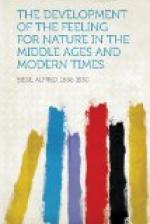CHAPTER I
CHRISTIANITY AND GERMANISM
When the heathen world had outlived its faculties, and its creative power had failed, it sank into the ocean of the past—a sphinx, with her riddle guessed,—and mediaeval civilization arose, founded upon Christianity and Germanism. There are times in the world’s history when change seems to be abrupt, the old to be swept away and all things made new at a stroke, as if by the world-consuming fire of the old Saga. But, in reality, all change is gradual; the old is for ever failing and passing out of sight, to be taken up as a ferment into the ever emerging new, which changes and remodels as it will. It was so with Christianity. It is easy to imagine that it arose suddenly, like a phoenix, from the ashes of heathendom; but, although dependent at heart upon the sublime personality of its Founder, it was none the less a product of its age, and a result of gradual development—a river with sources partly in Judea, partly in Hellas. And mediaeval Christianity never denied the traces of its double origin.
Upon this syncretic soil its literature sprang up, moulded as to matter upon Old Testament and specifically Christian models, as to form upon the great writers of antiquity; but matter and form are only separable in the abstract, and the Middle Ages are woven through and through with both Greco-Roman and Jewish elements.
But these elements were unfavourable to the development of feeling for Nature; Judaism admitted no delight in her for her own sake, and Christianity intensified the Judaic opposition between God and the world, Creator and created.
’Love not the world, neither the things that are in the world; if any man love the world, the love of the Father is not in him’: by which John meant, raise your eyes to your Heavenly Father, throned above the clouds.
Christianity in its stringent form was transcendental, despising the world and renouncing its pleasures. It held that Creation, through the entrance of sin, had become a caricature, and that earthly existence had only the very limited value of a thoroughfare to the eternal Kingdom.
While joy in existence characterized the Hellenic world until its downfall, and the Greek took life serenely, delighting in its smooth flow; with Christianity, as Jean Paul put it, ’all the present of earth vanished into the future of Heaven, and the Kingdom of the Infinite arose upon the ruins of the finite.’
The beauty of earth was looked upon as an enchantment of the devil; and sin, the worm in the fruit, lurked in its alluring forms.
Classic mythology created a world of its own, dimly veiled by the visible one; every phase of Nature shewed the presence or action of deities with whom man had intimate relations; every form of life, animated by them, held something familiar to him, even sacred—his landscape was absorbed by the gods.




